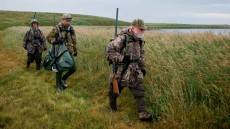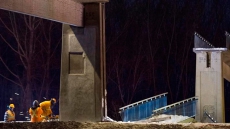TORONTO — A teenager left paralyzed after falling from a favourite climbing tree in a public park has no grounds to sue the municipality, Ontario's top court has ruled.
In a unanimous ruling, the Court of Appeal said there was no way municipal authorities could reasonably have foreseen the tragedy and acted to prevent it.
"Trees, being by their very nature things which can be climbed and therefore fallen from, are potentially harmful," the court said.
"Any danger posed by this tree was an obvious one. If you chose to climb it, you could fall and be injured."
The incident occurred in 2001, when Eric Winters, then 16, and friends were hanging out at the Kinsmen Park in Cayuga, Ont. As generations of teens had done before, according to trial evidence, Winters climbed a healthy willow on the banks of the Grand River they had dubbed the "Chilling Tree."
For reasons not clear, he fell from a branch. He was left paraplegic. He sued.
In June 2013, Superior Court Justice Dale Parayeski dismissed the lawsuit.
"In a perfect world, of course, all risks could be avoided, and no accident such as the tragic one in this case would ever occur," Parayeski said, adding a municipality monitored ban on tree climbing would have been called for.
"There has to be a reasonable limit to such prohibitions on human activity," he said.
In his appeal, Winters argued the judge was wrong to find the premises were reasonably safe and that the town's monitoring of the park, which it maintained, was deficient.
He also argued it should have been obvious to town officials that the "Chilling Tree" was "inherently unsafe" because no one was keeping a specific eye on it.
The Appeal Court rejected all the arguments, noting no one had ever complained about the tree in question. Nor had anyone hurt themselves — before Winters — save from one case where someone had twisted an ankle getting out of the tree while fooling around.
The lower court judge left little doubt he had found the park to be reasonably safe and the monitoring of the premises reasonable, the Appeal Court said.
"There is no duty to warn of such an obvious and self-evident danger (as tree climbing) nor any duty to monitor beyond what the township is doing at the time of this most unfortunate accident," the Appeal Court ruled.






